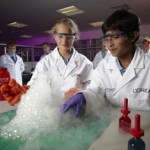education
I am Peter Economy, and I have for as long as I can remember been a fan and practitioner of both the arts (specifically, the musical arts) and science. Some years ago, I had the very good fortune to be invited by Harvey Seifter to help him write a book on New York's Orpheus Chamber Orchestra and its unique leadership model. As you may know, one of the things that sets Orpheus apart from most other orchestras is that it has no conductor. Instead, different musicians within the orchestra take on leadership roles depending on their own talents and interests. The book -- Leadership Ensemble:…
A major focus of The Art of Science Learning project is about attracting more students into the sciences and helping these STEM students become more creative and imaginative as they participate in the workforce.
But we should remember this is not just about the "STEM students" and assisting our physicists and engineers become more creative. It's also about bringing "science literacy" to a broader public - so that we are all better informed about our world and can make smarter personal decisions about issues that intersect with, say, how our bodies work, whether biofuels are good for the…
I have a whole pile of science-y book reviews on two of my older blogs, here and here. Both of those blogs have now been largely superseded by or merged into this one. So I'm going to be slowly moving the relevant reviews over here. I'll mostly be doing the posts one or two per weekend and I'll occasionally be merging two or more shorter reviews into one post here.
This one, of The Future of Reputation: Gossip, Rumor, and Privacy on the Internet, is from July 10, 2008.
=======
Another cautionary book about the effect of the Internet on our lives, this one concentrating on the effect that…
Ok, so it's not real. But this is an awesome proposal and post by a teacher:
I have used a bank many times. I have a checking account and a savings account (although I do admit I haven't added anything to my savings account for the past fifteen years since my pay has been frozen.) Nevertheless, the fact that I have made deposits, written checks, and I understand in theory the concept of a savings account makes me uniquely qualified to reorganize your operations.
I love that. Anyway, the proposal:
In a program I will call NDLB (No Depositor Left Behind) all banks will from this day on be…
One thing that I thought of while writing yesterday's mammoth post about scientific thinking and stereotypes was the notion of stereotype threat, the psychological phenomenon where students who are reminded of negative stereotypes right before a test tend to score worse than they do when taking the test without the negative reminder. This is a hot topic in education research at the moment, and it seems like EurekAlert throws me about one press release a week relating to the topic (or, at least, it seemed that way before I got too bust to keep up with EurekAlert).
I ended up not throwing it in…
Photo source.
Teaching kids science has always been a challenge, but why? Isn't a child's nature to explore and discover new things everyday? Every child has this capacity and somewhere along the way many of them lose the spark, the joy of discovery.
A survey by the recently launched laboratory facility for children, the L'Oréal Young Scientist Centre at the Royal Institution in the UK gave some good news and some bad news. The goal of this new facility is to "provide children aged seven to 18 and their teachers with an interactive, experimental space in which to explore science. "
First…
A few more comments on the scientific thinking thing, because it's generated a bunch of comments. As usual, some of them are good points, and some of them have completely misunderstood what I was trying to say. so let's take another crack at it.
While the post was worded somewhat strongly, I'm not really trying to stake out a position diametrically opposed to what Neil DeGrasse Tyson said. In fact, I suspect we agree more than we disagee. We certainly share the same broad goal, namely to see more people thinking more scientifically more often. The difference is really a question of emphasis.…
As a sort of follow-on from yesterday's post, thinking about the issues involved reminded me of a couple of browser tabs that I've had open for a while, namely this story about an education session at the AAAS meeting, and this Inside Higher Ed article on "Teaching Ambiguity". From the IHE piece:
Tidy may be comforting, but it is also banal, boring, conventional and unrealistic. That's why I have been asking faculty to infuse their classes with the element of surprise. By surprise I do not mean mysteriously taking a rabbit out of a hat, but rather incorporating experimental, untidy open-ended…
Juvenile Cowfish
Photograph by Chris Newbert, Minden Pictures
A photographer's strobe gives a violet sheen to this translucent juvenile roundbelly cowfish off the coast of Kona, Hawaii. Also known as the transparent boxfish, the roundbelly cowfish has two short horns in front of its eyes.
Stunned by the beauty of these photographs of translucent undersea creatures by National Geographic, I would like to share a few of my favorites.
Pelagic Octopus
Photograph by Chris Newbert, Minden Pictures
A pelagic, or open-ocean, octopus gives off a neon glow in Hawaii. Most species of octopus have…
This is about the symposium upcoming at McMaster University in Hamilton, Ontario, The Future of the Academic Library. The symposium is co-presented by Library Journal and McMaster.
It was announced on Twitter this past Sunday and there was a bit of a Twitter-storm about the conference as quite a few people (myself included) thought the program participants a bit problematic, to say the least.
But I'll let my University of Windsor colleague Mita Willliams take it from here. With her permission, I'm reposting the letter she wrote yesterday to President Deane.
I am writing this letter to you…
And I mean zombie vampire in the best way, as a comment on how hard it seems to be to kill my Stealth Librarianship Manifesto. It's even been translated into French! (Merci, Marléne!)
For a post I mostly wrote in an hour of white hot typing from midnight to 1 a.m. some weeknight when I should have been sleeping it sure has some legs.
There have been three posts about the manifesto fairly recently, mostly more critical than complimentary but with a lot of input that I really value.
Let's take a look.
Identity crisis? No. Or why I think we need to move beyond "stealth librarianship." by…
One of the supposed key innovations in educational 'reform' is the adoption of value added testing. Basically, students are tested at the start of the school year (or at the end of the previous year) and then at the end of the year. The improvement in scores is supposed to reflect the effect of the teacher on student learning*. I've discussed some of the methodological problems with value added testing before, and the Economic Policy Institute has a good overview of the subject. But what I want to discuss is a very serious flaw--what I would call fatal--with value added testing that stems…
Sadly, I'm not talking about the desire to learn. A recent survey of teachers (pdf) revealed the following about hunger in the U.S. classroom:
â¢When K-8 public school teachers consider a list of problems they face in the classroom, they rate discipline as the top problem (83 percent), with student hunger falling among the second tier of problems (40 percent), alongside lack of supplies (42 percent):
â¢Similar to 2009, four in ten teachers say that children coming to school hungry because they have not had enough to eat at home is a serious problem at their school (43 percent rate the…
Let's be honest: the past two weeks have been horrible. On Thursday and Friday, for example, I worked for over 24 hours straight (who needs sleep) on a single project. You may have noticed BioE's silence - no, when I don't have time to sleep, shower or go to the gym, I generally don't find time to post either. Yet during the past two weeks, or two years, I have never once wished I were back in the lab. This Experimental Error post pretty much sums it up:
Growing up, we were the smart ones. We were the valedictorians and the science fair champs, the celebrated nerds who read books for fun and…
Source.
"Undergrads have their pick of jobs, and companies are desperate to hire."
NPR, "Want A Job? You Ought To Be A Tech Geek" (Mar. 4, 2011)
The MIT motto, "Mens et Manus" {"Mind and Hand"}, embellished with the pronouncement "Nerd Pride" was all over campus when I was a postdoctoral there in the late eighties. In the dark days of this recession with unemployment rates remaining at about 9%, a ray of hope has emerged in the technology sector. Nurture the nerd within, and you could have multiple job offers.
According to NRP, it could be "opposite day" - a time when companies are…
I saw this just after I published my previous post and think it really encompasses what I'd like to say to HarperCollins and its fellow travelers.
This is from The Capitalist's Paradox by Umair Haque.
So here's my question: Does what you're doing have a point -- one that matters to people, society, nature, and the future?
Beancounters, listen up. To paraphrase Shakespeare, I come not to praise you, but to bury you. I don't care about your "strategy," "business model," "campaign," "product," or "deliverables" (sorry). All that stuff is focused on outputs. What matters to people, in contrast,…
He might be really good at designing operating systems (or not), but Bill Gates has a slight data problem. In an op-ed arguing that class size is unimportant and that teacher evaluation is crucial--and should be combined with merit pay, Gates makes this blunder (italics mine):
Perhaps the most expensive assumption embedded in school budgets - and one of the most unchallenged - is the view that reducing class size is the best way to improve student achievement. This belief has driven school budget increases for more than 50 years. U.S. schools have almost twice as many teachers per student as…
Or something. David Wescott brings a strong dose of reality to the myth of overpaid public sector workers:
Wisconsin has some economic problems, but overpaying teachers is not one of them. The starting salary for a teacher in Wisconsin: $25,000. College degree required, along with extensive review and licensing issues. Your average teacher can look forward to a salary somewhere in the mid 40's. This is NOT a lot of money. Despite this, the teachers' unions have already conceded to the GOP's demands to cut their salary and benefits. So the budget arguments are off the table.
The average…
This one is via Christina Pikas, Bobbi Newman and Sarah-Houghton-Jan, who originated it.
It's released under a CC0 license, so please feel free to repost, remix and whatever else strikes your fancy.
This arises from the current controversy in the library world (and beyond) about a particular publisher restricting the number of checkouts a library ebook can have before the library needs to pay for it again. Bobbi Newman collects a lot of relevant posts here if you're interested. I may post about the situation in more detail later this week.
The eBook Users Bill of Rights:
Every eBook user…
Source: "Girls As Inventors," The Huffington Post on the MIT Media Lifelong Kindergarten Group.
While science and technology may be complex and daunting, one thing is quite clear: we need more women to drive innovation and to provide different insights and perspectives compared to men. Tomorrow, March 1st at 11 am EST, The Dow Chemical Company and Scientific American are hosting a Virtual Conference to Engage Scientific Thought Leaders on the Future of Women in Chemistry.
I invite you to listen, learn and add your voice.
According to the website:
60 speakers. 60 minutes.
60 insightful…



